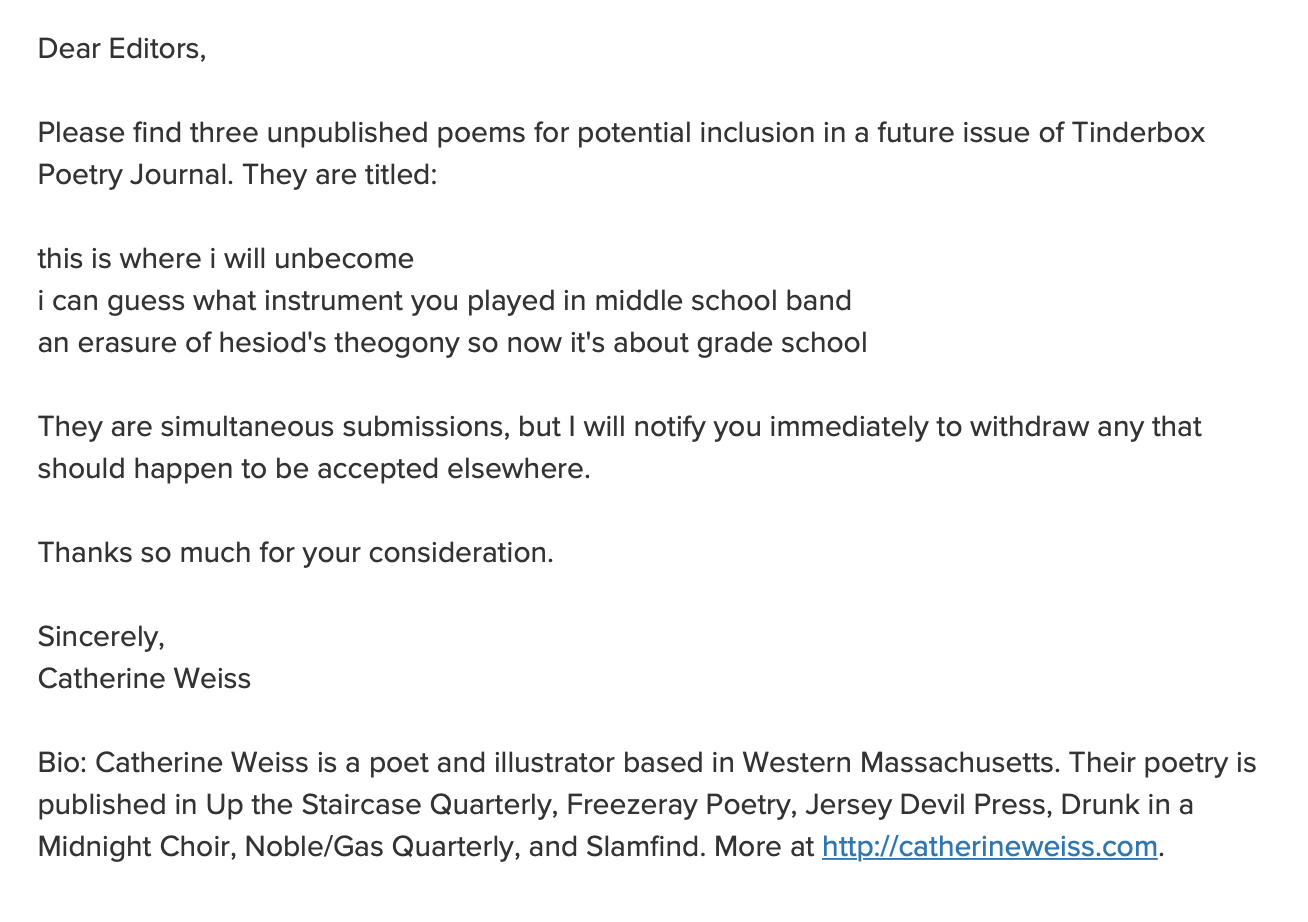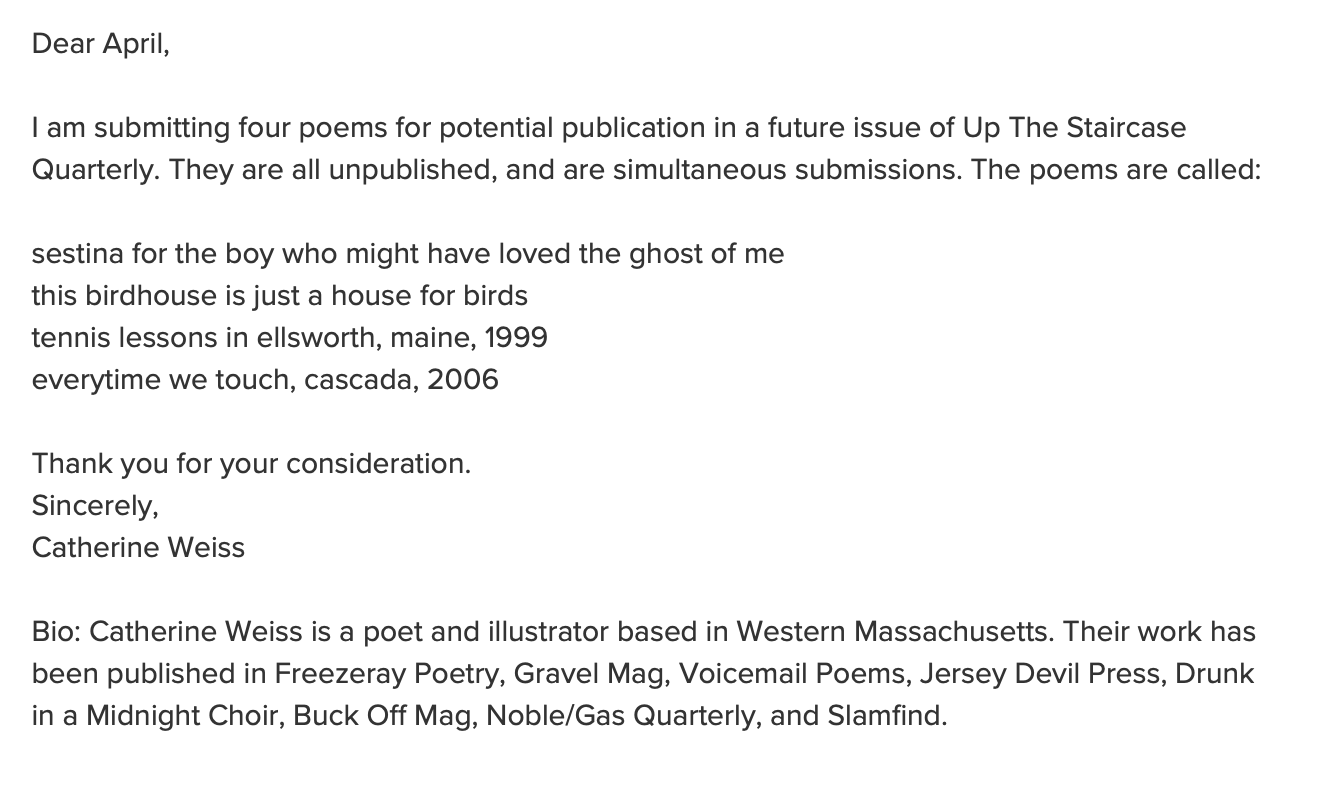cover letters for lit mags
I get the impression a lot of poets don’t submit to lit mags very much because they’re afraid of the cover letter. I think there are probably a lot of reasons to not submit to lit mags, but the cover letter being a barrier is not a good reason, in my opinion!
A cover letter for most poetry submissions is perfunctory. This is not the same sort of deal as a cover letter for a job, in which you actually have to say something interesting. A cover letter for a poetry literary magazine has few elements, and you can basically just use a template with a few optional add-ons.
Here is an example cover letter from one of my submissions:
Here is another:
Both of these examples had poems accepted from these submissions, so at least that’s some evidence I’m not wildly out of touch, sending out zany or offensive cover letters.
Some things to note:
Addressing the cover letter. You want to ideally address a cover letter either to 1-2 people by name. You figure out who that might be by going to the website and looking at the masthead page. This is the list of who works at the magazine/journal. Some journals are only run by 1-2 people, some list a hierarchy of people. If there aren’t jobs listed but only 1 or 2 people listed, use their name. Unless I know them personally, I use “Dear [First Name]” as opposed to something more informal, like “Hi”. If there are more than a couple of people working there, address your letter to the Poetry Editor. Sometimes the website will say whom to address the letter to, which of course, you should do as instructed. If you can’t figure out from the website who to address your letter to, do as I did in the 1st example, and address the letter “Dear Editors”. That’s usually fine anyway.
Introduction. Include a sentence to say what you’re doing. I say how many poems I’m submitting, and I include the name of the journal here. If it’s a contest, or submitting to a specific issue or theme, I say that here. I sneak in the fact that they’re unpublished (which they usually are; most journals don’t publish reprints), which I do just to build confidence I know how this all works.
Titles. Sometimes I include the titles of the poems. Sometimes I don’t—I don’t get the sense that’s an important part of the cover letter, though I’ve seen it requested a few times in the guidelines.
Simultaneous submissions. Most journals I submit to are online and accept simultaneous submissions, though many more established journals still do not. (Make sure of their rules before you submit!) I put in a sentence that indicates I have read and understand their stated guidelines. It’s about building confidence and showing respect for their time and process.
Say thanks! I like “thanks for your consideration” because it thanks them in advance of their reading but is less catty than actually saying “thanks in advance” which is an awful thing to say to anyone, don’t ever say that.
I sign off with “Sincerely,” because this is a cover letter, after all, and sign my name.
Bio. Usually a is requested for in the submission guidelines. I don’t try to work a 3rd person bio into the body of a cover letter because that sounds stressful. Tip: I keep several versions of my bio saved in one file on my computer and I update them so that I can copy and paste the appropriate length version into the end of the cover letter. Worried about length? When in doubt, 50-75 words. Third person.
Your cover letter usually gets written in Submittable or in the body of an email, depending on their rules! Sometimes I add an additional sentence to a cover letter if the situation merits it, such as:
You have submitted to the journal before and they asked you to submit again: Your encouraging note from my previous submission in November buoyed my spirits all last winter! Thank you.
You have had work accepted by this journal before: I was thrilled to have my poem, Name Of Poem, appear in Journal Name’s Winter 2016 issue.
You personally know one of the editors: Dear Editor1, and Editor2, I had the great pleasure of studying alongside Editor2 in Name Workshop this past August and I was so happy he suggested I submit. So here here I go, tossing my hat in the ring.
You should be reading back issues to magazines you submit poetry to anyway, but I usually don’t talk about it in a cover letter because I don’t think editors care that much for reading long, sycophantic emails. They probably would rather just get on with it and read your poems.

